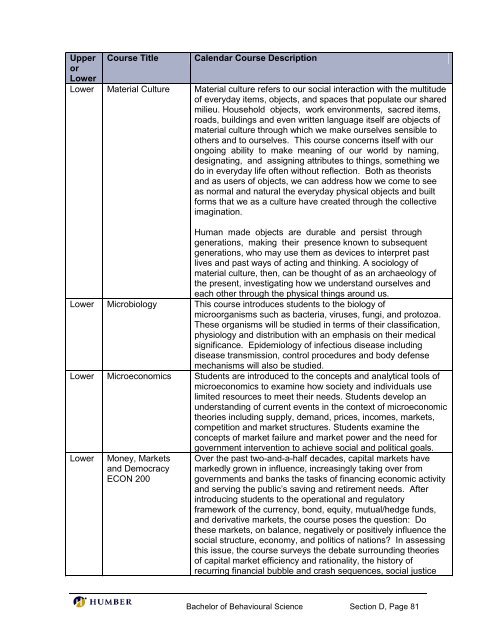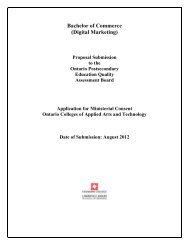Bachelor of Behavioural Science - Postsecondary Education Quality ...
Bachelor of Behavioural Science - Postsecondary Education Quality ...
Bachelor of Behavioural Science - Postsecondary Education Quality ...
Create successful ePaper yourself
Turn your PDF publications into a flip-book with our unique Google optimized e-Paper software.
Upper Course Title Calendar Course Description<br />
or<br />
Lower<br />
Lower Material Culture Material culture refers to our social interaction with the multitude<br />
<strong>of</strong> everyday items, objects, and spaces that populate our shared<br />
milieu. Household objects, work environments, sacred items,<br />
roads, buildings and even written language itself are objects <strong>of</strong><br />
material culture through which we make ourselves sensible to<br />
others and to ourselves. This course concerns itself with our<br />
ongoing ability to make meaning <strong>of</strong> our world by naming,<br />
designating, and assigning attributes to things, something we<br />
do in everyday life <strong>of</strong>ten without reflection. Both as theorists<br />
and as users <strong>of</strong> objects, we can address how we come to see<br />
as normal and natural the everyday physical objects and built<br />
forms that we as a culture have created through the collective<br />
imagination.<br />
Human made objects are durable and persist through<br />
generations, making their presence known to subsequent<br />
generations, who may use them as devices to interpret past<br />
lives and past ways <strong>of</strong> acting and thinking. A sociology <strong>of</strong><br />
material culture, then, can be thought <strong>of</strong> as an archaeology <strong>of</strong><br />
the present, investigating how we understand ourselves and<br />
each other through the physical things around us.<br />
Lower Microbiology This course introduces students to the biology <strong>of</strong><br />
microorganisms such as bacteria, viruses, fungi, and protozoa.<br />
These organisms will be studied in terms <strong>of</strong> their classification,<br />
physiology and distribution with an emphasis on their medical<br />
significance. Epidemiology <strong>of</strong> infectious disease including<br />
disease transmission, control procedures and body defense<br />
mechanisms will also be studied.<br />
Lower Microeconomics Students are introduced to the concepts and analytical tools <strong>of</strong><br />
microeconomics to examine how society and individuals use<br />
limited resources to meet their needs. Students develop an<br />
understanding <strong>of</strong> current events in the context <strong>of</strong> microeconomic<br />
theories including supply, demand, prices, incomes, markets,<br />
competition and market structures. Students examine the<br />
concepts <strong>of</strong> market failure and market power and the need for<br />
government intervention to achieve social and political goals.<br />
Lower<br />
Money, Markets<br />
and Democracy<br />
ECON 200<br />
Over the past two-and-a-half decades, capital markets have<br />
markedly grown in influence, increasingly taking over from<br />
governments and banks the tasks <strong>of</strong> financing economic activity<br />
and serving the public‘s saving and retirement needs. After<br />
introducing students to the operational and regulatory<br />
framework <strong>of</strong> the currency, bond, equity, mutual/hedge funds,<br />
and derivative markets, the course poses the question: Do<br />
these markets, on balance, negatively or positively influence the<br />
social structure, economy, and politics <strong>of</strong> nations In assessing<br />
this issue, the course surveys the debate surrounding theories<br />
<strong>of</strong> capital market efficiency and rationality, the history <strong>of</strong><br />
recurring financial bubble and crash sequences, social justice<br />
<strong>Bachelor</strong> <strong>of</strong> <strong>Behavioural</strong> <strong>Science</strong> Section D, Page 81
















